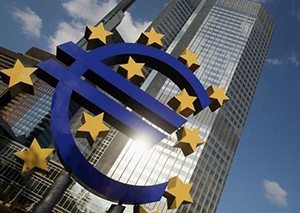The Eurozone has finally slipped into deflation after months of morbid economic inactivity.
Inflation was -0.2% in December, according to a statement from Eurostat, the European Union’s official statistics agency.
This is a drop of 0.5% from a rate of 0.3% in November.
Eurostat says the fall into deflation is due to rapidly collapsing energy prices, while prices for food, other goods and services remained stable.
The main factor impacting the Eurozone has been the plunge in oil prices, which hit a record low of just $50 a barrel – half the price of a year ago.
Meanwhile, the value of the euro has hit a nine-year low against Sterling and the US dollar.
Political uncertainty
The fall followed another announcement from European Central Bank president Mario Draghi that the bank is readying for a period of quantitative easing to revive the stagnant single currency economy.
Although interest rates are at record lows, the bank has failed to follow the recovery in the UK and US which was sparked by central banks buying bonds.
Economists argue that deflation will at last force the hand of the ECB to take some action to control inflation and to shake the Eurozone out of a culture of austerity.
The problem is Draghi may be the ECB’s mouthpiece, but politicians in France and Germany disagree over the way forward for their economies and are restraining him from taking action.
The price of the euro has also suffered due to the rekindling of political uncertainty in Greece,
A surprise national election has been called for January 25 – and fears are that the coalition likely to win will immediately withdraw from the Eurozone.
Oil hits new low
Speculation about the move has seen billions wiped off the London and other European stock exchanges.
German chancellor Angela Merkel has commented that the move would not affect the terms of Greece’s multi-billion euro bail out, but doubts are still undermining the markets.
Analysts at bank Citigroup expect the price of oil to continue to fall for at least six months as output continues to exceed supply as oil producing nations fight a war of attrition for international market share.
Russia, one of the world’s largest oil suppliers has seen the value of the rouble collapse by 47% against Sterling and the US dollar in the past year, as sanctions over the annexation of The Crimea from Ukraine continue to bite.
Inflation is currently running at 11.4% while the central bank has hiked interest rates to almost 20%.
